|
|
Σάββατο, 12 Ιουλίου 2025
|
|
|
|
|
|
Welcome to our website. At first sight it might seem small and poor, but once you click on the various options right below this message, a whole world of miscellaneous articles, photos, activities, audible messages in mp3 form, news about our ministry, good Christian music, etc., etc., is opened up before you. Only, as you go around stop at the titles where the little arrow turns into a little hand and then click. Also, by clicking on some pictures they may be enlarged.You can find much more than you can imagine! You can comment or suggest anything in the Guest Book or send an e-card. In case you'd like to use any of the contents, please, refer to:markosboussios@gmail.com
|
|
|
|
|
 |
|
|
 |
|
|
 |
|
|
 |
|
|
 |
|
|
 |
|
|
 |
|
|
 |
|
|
 |
|
|
 |
|
|
 |
|
|
 |
|
|
 |
|
|
 |
|
|
 |
|
|
 |
|
|
 |
|
|
 |
Ιούλιος 2025 |
 |
| S |
M |
Τ |
W |
T |
F |
S |
 |
| 30 |
31 |
1 |
2 |
3 |
4 |
5 |
| 6 |
7 |
8 |
9 |
10 |
11 |
12 |
| 13 |
14 |
15 |
16 |
17 |
18 |
19 |
| 20 |
21 |
22 |
23 |
24 |
25 |
26 |
| 27 |
28 |
29 |
30 |
31 |
1 |
2 |
|
|
|
|
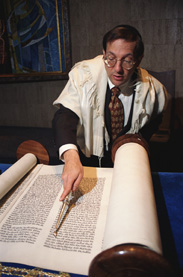
|
9 Whom shall he teach knowledge? and whom shall he make to understand doctrine? them that are weaned from the milk, and drawn from the breasts. 10 For precept must be upon precept, precept upon precept; line upon line, line upon line; here a little, and there a little: 11 For with stammering lips and another tongue will he speak to this people.
|
|
ISAIAH 28:9-11
|
|
|
|
|
|
Home Page/Profitable knowledge
|
|
|
|
|
|
|
|
|
|
|


Come unto me, all ye that labour and are heavy laden, and I will give you rest. Matthew 11: 28.
This is one of the best known sayings of our Lord Jesus Christ. Many people who otherwise know very little about the Bible are acquainted with it. But who would go so far as to maintain that he belonged to the class of weary and heavy laden persons? Most endeavor to come to terms with their problems themselves. They do not like to admit their troubles, or guilt, or say, «I am unhappy.»
You may be someone with an exemplary way of life and a good reputation, who would have a lot to lose by such an admission. In your environment you must count as the one who is strong and competent. Yet, inside you, you feel that something is missing. You are in good company: Nicodemus, a highly situated and respected leader of the Jews was one such person. He feared his image among the people; so he went to Jesus by night (cf. John 3: 1-21). It was a pity he couldn't pluck up enough courage to go openly, but being under the cover of darkness was better than not going at all. His later life proved that. Follow his example! Get to know the Lord Jesus by reading the Bible; start with the gospels and then go on to the epistle to the Romans.
Perhaps you have had a lot of upsets in life and have nothing to lose in the way of reputation. The Lord Jesus died on the cross for the likes of you and He is waiting for you to come. Kneel down and pray to Him, confessing all the guilt of your life. Even if it means tears, don't be ashamed! You, too, need to read the Bible. It has a message for everybody, «for all have sinned» and by accepting Him by faith as Savior you can be «justified freely by his grace» (Romans 23: 24).
|
|
|
|


|
|
|
THE QUAILS
Greece was suffering greatly under the heel of the German invader. The
worst famine the country has ever known in all of its long history was
mercilessly and indiscriminately taking a heavy toll on young and old,
and in cities like Athens, Salonica, Patras et. al., the dead were
picked up from the streets by carts and taken out of town for massive
burials. Our family, consisting of mother and seven children, six girls
and myself, father having died of pneumonia a little earlier, lived up
in northern Greece, in Pogoni of Jannina and a village called lower
Ravenia. The house we stayed at was, of course, old, but large enough,
having a front yard as big as a small farm. I remember during a long and
severe winter, when the snow stayed on the ground for weeks and months,
mother would take a shovel and going out would clear the snow of about a
space of two square meters, then would take a sieve, of those used to
sift sand, gravel and suchlike, and set it one side on the ground the
other somewhat elevated, being supported that way by a stick on which a
string, long enough to reach inside the house through a purposely kept a
little bit open window. The distance was about fifteen meters. Under
the sieve she'd spread crumbs of bread. Then she'd summon us to prayer
and we would hear her say «Father, send your quails», thank you, amen!
Did God hear that prayer?
Glory to Him, He sure did! Shortly birds
of various sizes swarmed under the sieve and started swallowing the
crumbs of bread! Then mother would pull the string and the sieve would
capture them. Thus we would have meat to eat for more than one day! This
was done many times and when the birds wouldn't seem to come, mother
would call us to prayer and God would answer the same way. God is still
the same! Remembering some of His many wonderful provisions in the past,
the petition «Lord, increase my faith» is never missing from my
prayers! To God be the glory, great things He has done!
|
|
|
|
|
|
|
|
|
|
|
|
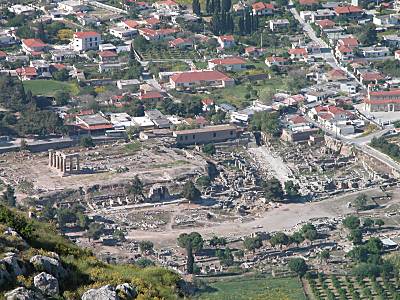
Corinth - 1
View of ancient Corinth from some point of the Acrocorinthus. One can see ruins of the Temple of Apollo, of Krenes (Springs) and the Agora, as well as of other important structures, that the archaeological spade, brought, at times, to light. One also sees modern buildings, mostly houses, developing not far from the archaeological site. There is no doubt that, from the Christian point of view, Corinth presents a special interest. To this ...
»
|
|
|
|
|
|
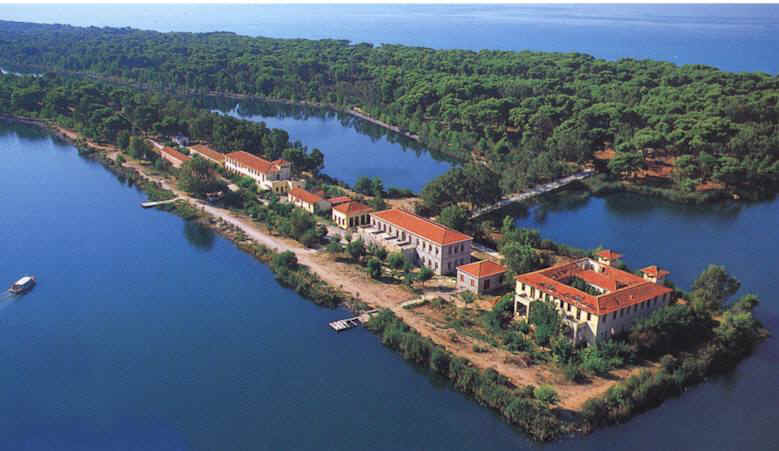
Kaifas Spa
The picture is certainly beautiful. It shows one of the many spas Greece is endowed with. Here people come, according to doctors' advice, to have mineral therapeutical baths. But that is not the purpose for which we placed this picture here. It is rather to refer on the one hand to Bethesda and Siloam, which by God's merciful intervention seem to have been something similar, and on the other to point to Jesus Christ, Whose precious blood shed ...
»
|
|
|
|
|
|
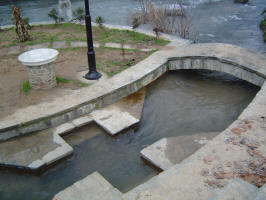
Lydia
Philippi was an important city, in many respects, when the Apostle Paul visited it. He had been waiting for divine direction at Troas of Asia Minor with his companions in the ministry of the gospel, when the Macedonian call came. Philippi was about fifteen kilometers inland from Neapolis, the port town, where the Apostle disembarked. From Luke's narration one should think they spent no time at Neapolis, today's important and thriving Greek ...
»
|
|
|
|
|
|
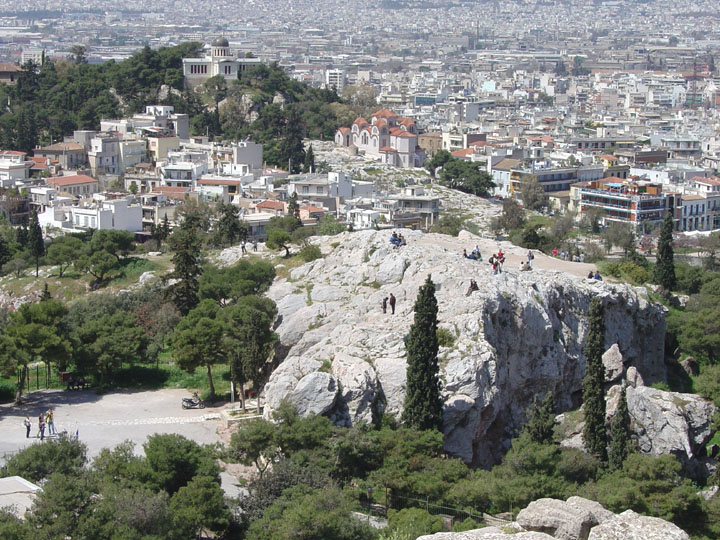
Mars Hill-Athens
View of Mars Hill and partial of Athens from some point of the hill of the Acropolis. As we have also noted elsewhere, Athens was the only city of all that Paul visited, where not only was he not persecuted, but rather treated well and given the opportunity from, in all probability, the most official platform, Areopagus, to address one of the most cultivated audiences of the Greco-Roman world, with the message of Christ and the Resurrection. ...
»
|
|
|
|
|
|

 The Hellenicity of Ancient Macedonia
The Hellenicity of Ancient Macedonia
ΤΡΊΤΗ, 3 ΙΑΝΟΥΑΡΊΟΥ 2012
THE HELLENICITY OF ANCIENT MACEDONIA
The Hellenicity of ancient Macedonia, even in a larger geographical sense, can be proven in many ways, but I believe the book of Daniel alone would be enough. In chapter 8 verse 21 we read: "And the rough goat is the king of Grecia", referring to Alexander the Great. Notice the fact that he is not referred to as the king of Macedonia, which wouldn't make any difference anyway since Macedonia was part of the Hellenic World, but as the king of Hellas (Grecia, Greece!). Alexander himself had been born of Greek parents, and raised up as Greek under the tutorship of the greatest of the Greek philosopher, Aristotle, and spoke and spread all over the vast empire he had formed by his speedy conquests, the Greek language, which, with some slight variations, Greeks speak today, the language known among scholars all over the world as the Koine. And, together with the language he also spread the Greek civilization which is the civilization of the Western World up to this day. It was also the Koine in which the Septuagint was translated from the Hebrew by orders of Ptolemy Philadelphus about 250 BC, and it was in the same language that the New Testament was written, too. This is much stronger a proof that Alexander the Great was Greek than that Everest is the highest mountain in the world! Markos Boussios.
|
|
|
|

